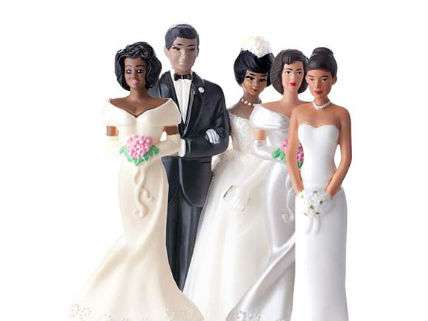In the Gay Wedding Cake Wars, Christians Preheated the Oven
Today's religious freedom controversies got their start in the 19th century debate over outlawing polygamy.

Where did the idea come from that small-business owners and religiously affiliated charities are at the mercy of lawmakers to decide whether they can exercise their faith?
All around us, governmental bodies at the state and federal level are claiming the authority to override the choices of private groups and individuals on questions such as whether or not to participate in a same-sex marriage celebration, and whether or not to offer insurance coverage for the morning-after pill. It's easy to assume these efforts are a thoroughly modern phenomenon. But in truth, this fight began more than 150 years ago. The only difference is that back then, Christian traditionalists were the ones trying to regulate a religious practice out of existence via laws that openly targeted members of the nascent Mormon faith.
In 1862, Congress outlawed plural marriage despite anguished protest from the Latter-day Saints, who at the time believed God wanted their men to take multiple wives. In subsequent decades, the U.S. Supreme Court repeatedly upheld the government's right to do as much. In the process, the Court laid down a precedent that the Constitution protects only your right to believe as you wish, but not your right to put those beliefs into practice in ways the state might not approve of.
"As the nation goes to war over birth control mandates and gay wedding cakes," I write in the April issue of Reason, "many religious supporters of traditional marriage and sexual mores understandably feel their rights are being trampled. But so did the Mormons a century ago. To justify the anti-polygamy laws forbidding that group to live out its faith, Christian traditionalists stretched the First Amendment to precarious lengths. Now, the arguments they created and employed are being turned against them."


Show Comments (0)